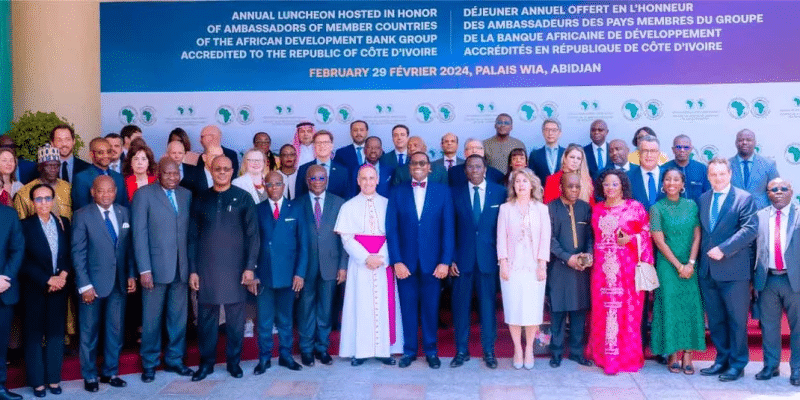The traditional annual luncheon offered by the African Development Bank (AfDB) to the diplomatic corps in Ivory Coast had not been held since 2019 because of Covid-19. For its relaunch in 2024, the institution took the opportunity to announce, in figures and hopes, a future of sustainable growth for Africa.
African countries will no longer be sinking for long into climate vulnerability, economic recession and even indifference on the international stage. Instead, the coming years promise to be full of resilience and development for the continent. That, at any rate, is the prediction of the African Development Bank (AfDB), which recently announced that Africa will have 11 of the 20 fastest-growing economies in the world by 2024.
The announcement was made at the Bank’s annual luncheon for ambassadors, heads of diplomatic missions and representatives of international organisations based in Abidjan, Ivory Coast. During his speech, the AfDB President emphasised that African nations “continue to record faster economic growth than the world average (after Asia, editor’s note) of 3%”.
Akinwumi Adesina stressed that this was an impressive score given the “natural disasters, geopolitical tensions, rising inflation, food insecurity and increasing debt”. This economic transition should be achieved thanks to several positive factors identified by the Nigerian economist. First and foremost, the AfDB’s capital, which has risen from 93 billion dollars to 208 billion dollars in recent years, thus providing ample room for manoeuvre in the implementation of innovative financing.
Concrete action for Africa
Secondly, the 16th replenishment of the African Development Fund (ADF), with $8.9 billion in contributions from donor countries, is expected to help mobilise an additional $27 billion in capital market financing. According to the AfDB, the aim is to increase “economic development assistance to the 37 low-income countries” in an inclusive manner that will enable all 54 member states to achieve sustainable development.
Read also-Wilfried Adingra: « All innovative financing must be absolutely linked to the SDGs »
In this respect, the annual Abidjan luncheon was an opportunity to mention a number of successful pan-African policy projects, such as “the construction of the Senegambia bridge, which now links Gambia and Senegal”, and the Lobito rail corridor, which is expected to link Angola, Zambia and the Democratic Republic of Congo (DRC) in the near future, thanks to $500 million in co-financing from the AfDB.
Benoit-Ivan Wansi






